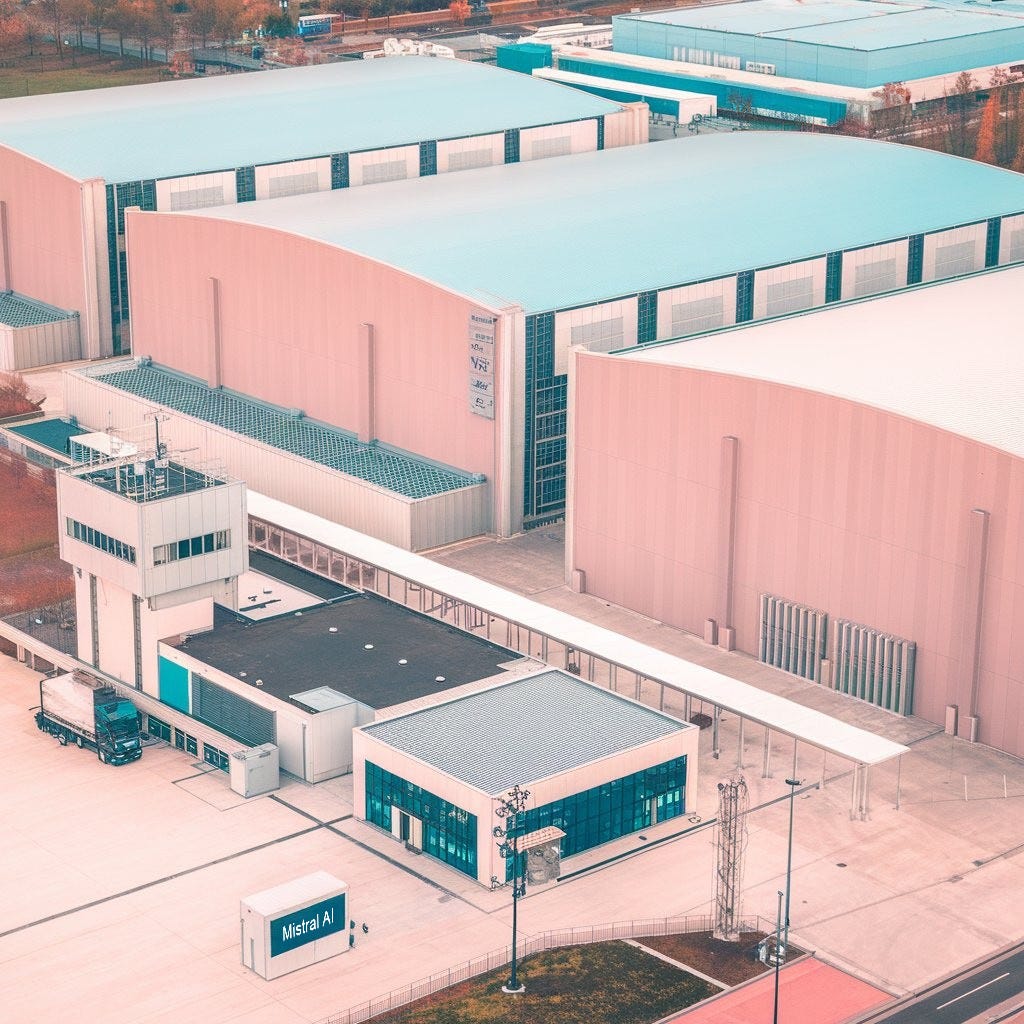Can Mistral’s $1B AI Cloud Make France a Sovereign Superpower in the AI Race?
Inside the funding round that’s not just about models, but about who owns the rails of AI compute, compliance, and control.
Welcome to Global Data Center Hub. Join 1700+ investors, operators, and innovators reading to stay ahead of the latest trends in the data center sector in developed and emerging markets globally.
What if the next OpenAI isn’t American?
What if it’s open-source, France-born, and Gulf-funded?
Mistral AI, barely 24 months old, is reportedly raising $1 billion in fresh capital. Its lead backer? Abu Dhabi’s newly formed MGX fund, a $100B sovereign investment vehicle with a mandate to build the global AI stack from silicon to sovereignty.
But this isn’t just a big funding round.
It’s a geopolitical play. A national strategy. And a bet that the future of AI won’t be won on model performance alone but on control, compliance, and compute.
Let’s break down why this is the most important AI infrastructure deal you haven’t heard enough about.
Mistral’s Big Pivot: From Models to Infrastructure
Mistral isn’t new to headlines. Founded by alumni of DeepMind and Meta, it’s behind two of the fastest-growing open-weight LLMs Mixtral and Mistral Large. Just last year, it raised $640M at a $6.5B valuation, with backers including Microsoft, Nvidia, Salesforce, General Catalyst, and a16z.
But the next chapter is different.
This new $1B raise will fund Mistral Compute a sovereign AI cloud platform built entirely in France.
Not just models anymore Mistral is vertically integrating: cloud, silicon, software, and regulatory compliance.
It’s a full-stack play, designed to give France ownership over its AI infrastructure future.
The implications go far beyond Europe.
Why MGX’s Role Is a Big Deal
MGX isn’t a typical investor. It’s not just deploying capital it’s building capability.
Launched by Abu Dhabi in 2024, MGX is chaired by UAE national security chief Sheikh Tahnoun bin Zayed
Backed by Mubadala and G42
Co-founder of the $100B+ AI Infrastructure Partnership with Microsoft, BlackRock, and Nvidia
So when MGX steps in, it signals more than money. It signals state-aligned intent.
The Mistral investment is part of a growing France–UAE AI alliance, including a €50B commitment to French AI infrastructure, talent, and semiconductors.
At the core of this partnership is trust between sovereigns. France brings talent, regulation, and nuclear-powered data sovereignty. The UAE brings oil-fueled capital and geopolitical flexibility.
Mistral now sits at the intersection.
The Strategic Architecture of the Deal
The capital structure itself tells a story.
Mistral is not just raising equity. It’s also negotiating hundreds of millions in debt financing from French state-backed lenders like Bpifrance.
That’s smart financing design.
High-risk equity goes toward R&D, hiring, and platform buildout. Low-cost debt is earmarked for tangible infrastructure namely, a next-gen AI data center campus powered by 18,000 Nvidia Grace Blackwell chips.
France gets national tech infrastructure on home soil. MGX gets to hedge its exposure to Silicon Valley. And Mistral gets a capital stack that funds a hyperscaler without handing over control.
This isn’t venture capital. It’s modern industrial policy wrapped in the skin of a startup.
France gets national tech infrastructure on home soil. MGX gets to hedge its exposure to Silicon Valley mirroring Khazna’s $5.5B strategy to lead Saudi Arabia’s data center boom, where sovereign capital is reshaping hyperscale development through long-term national planning.
The Competitive Thesis: Compliance + Control
Here’s where it gets interesting.
Mistral is not trying to beat OpenAI on frontier model performance. That’s a race with marginal returns and astronomical cost.
Instead, Mistral is optimizing for:
Performance per dollar
Tokens per watt
Speed per second
Jurisdictional trust
Its flagship assistant, Le Chat, processes up to 1,000 tokens per second faster than ChatGPT’s 650. Its API pricing is $8 per million tokens versus GPT-4’s $30.
But the real differentiator? Data sovereignty.
Mistral Compute will offer AI infrastructure hosted entirely within France. That means no data subject to the U.S. CLOUD Act. No foreign exposure for banks, health systems, or governments that must comply with GDPR.
It’s not just a better cloud. It’s a trusted cloud.
And that’s a moat Amazon or OpenAI can’t easily build.
Instead, Mistral is optimizing for performance per dollar, tokens per watt, and jurisdictional trust core metrics now driving global site selection, as detailed in Gridlock: The Energy Crisis That's Rewriting Data Center Investment Strategy.
From Open-Weight to Walled Garden
The genius of Mistral’s model is in the funnel.
The company open-sources powerful base models under Apache 2.0.
Developers use them freely, driving global adoption and community trust.
Enterprises then hit scale issues and need optimization, security, and compliance.
Enter Mistral Compute a purpose-built environment optimized for performance, latency, and legal compliance.
The open models are the bait.
The sovereign cloud is the monetization engine.
And if Mistral pulls it off, it won’t just be a French success story.
It’ll be Europe’s first full-stack AI sovereign.
Why This Signals a New Phase in the AI Race
The first phase of the AI boom was about foundational models.
The second will be about foundational infrastructure.
Not just what models you build.
But where they run.
Who owns the silicon.
Who controls the data.
And which laws govern the system.
Mistral is betting that the next AI winners won’t just be better labs they’ll be sovereign platforms.
Vertically integrated. Legally trusted. Geopolitically aligned.
France and the UAE are building that now.
And $1 billion is just the down payment.

